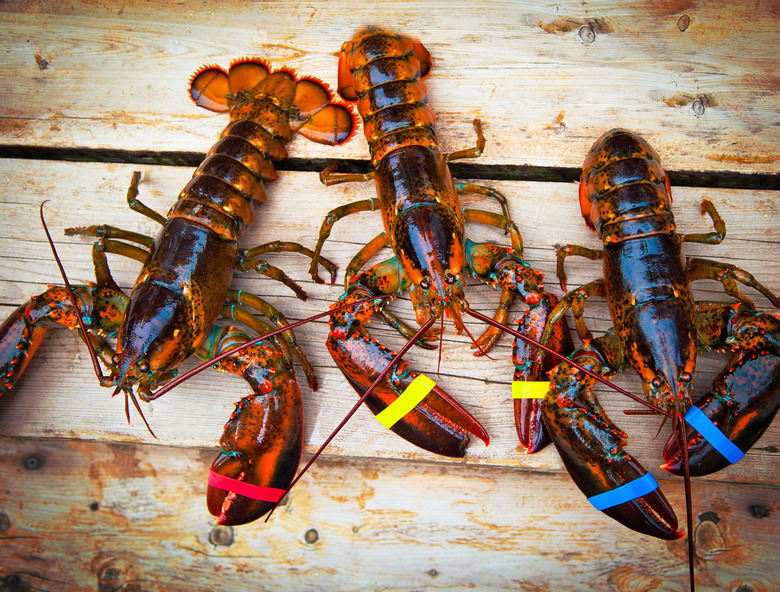Life Span Of Lobsters
Lobsters are crustaceans that dwell at the bottom of the ocean. They have 10 legs and sometimes two claws, like their crab cousins. Many species of lobster make up a variety of seafood menu options from lobster bisque to lobster thermidor. Species that humans hunt and eat are at risk of population decline. However, all species of lobster are susceptible to disease from oceanic pollution that can limit their life span. Still, the lobster life expectancy can be surprisingly long.
Lobster Reproduction
Lobster Reproduction
When a male and female lobster are ready to mate, they will fight with each other and do the lobster's equivalent of urinating on each other's faces. The scent of the urine will tell the lobsters what they need to know about each other to mate. The female lobster will typically object unless she has recently shed her shell and began growing a new one. If the female is ready to mate, she will allow the male to put her on her back and mate with her. If she is not, she will continue to fight him and he will eventually leave her alone.
Egg to Juvenile Stage
Egg to Juvenile Stage
Once a female lobster's eggs — which may exceed 100,000 — fertilize, she releases them from her body. They then stick to a part of her abdomen that contains swimmerets — abdominal appendages — and remain there for up to a year. When they hatch, their mother releases them into the water by moving her swimmerets. At this time, they rise to the surface as small larvae. After the baby lobsters shed their shells four times, they sink to the bottom of the ocean and find shelter. They will continue to molt throughout their lives. Without doing so, they would be unable to grow.
Juvenile Stage
Juvenile Stage
The juvenile stage of lobster development lasts from five to eight years. During this time, juvenile lobsters will molt up to 25 times. When they molt, they sometimes eat their old shells so they can regain the lost calcium and because they get hungry after molting. Lobsters that fishermen capture typically reach the legal size for capture during this stage.
Adult Stage
Adult Stage
Adult male lobsters molt once every year and female lobsters molt once every two years until they die. This is the stage in life where they begin reproducing. While breeding, a male may have several female partners, one at a time, in his burrow. A female will have only one male partner per season, but she will have several partners over her lifetime. While they are certainly not immortal animals, lobsters may live to be roughly 100 years old.
Cite This Article
MLA
Barclay, Shelly. "Life Span Of Lobsters" sciencing.com, https://www.sciencing.com/life-span-lobsters-8529233/. 22 November 2019.
APA
Barclay, Shelly. (2019, November 22). Life Span Of Lobsters. sciencing.com. Retrieved from https://www.sciencing.com/life-span-lobsters-8529233/
Chicago
Barclay, Shelly. Life Span Of Lobsters last modified March 24, 2022. https://www.sciencing.com/life-span-lobsters-8529233/
